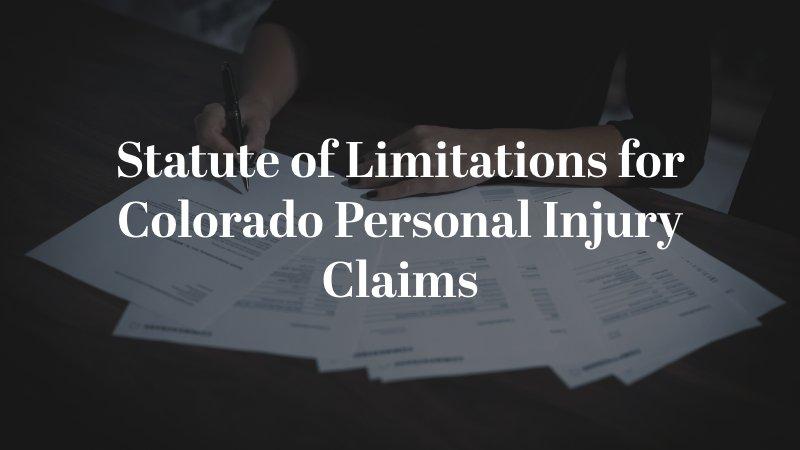A statute of limitations is a legal deadline for filing a lawsuit in court. The court usually dismisses lawsuits filed outside of their statutes of limitations. This leaves the victim without any means of recovering their monetary damages.
Statutes of limitations vary according to state, case type, and the party being sued. A large part of Colorado’s personal injury claims have a two-year statute of limitations.
The two-year deadline begins to accrue on the date of the accident or the date the injury is or should have been discovered. Colorado’s two-year statute of limitations does not apply to every personal injury claim.
If you suffered a personal injury in Colorado, have your case reviewed by an experienced attorney. Doing so will ensure you do not miss your claim’s statute of limitations and opportunity for compensation.

Why Do Statutes of Limitations Exist?
At a glance, statutes of limitations may seem arbitrary. However, they are an important part of a fair justice system.
Personal injury cases rely on eyewitness testimony and the availability of recorded evidence. Eyewitness testimony becomes less reliable over time and vital records tend to disappear. This makes case-building difficult for both parties to a case and could lead to an incorrect or unfair case outcome.
Statutes of limitations also provide a foreseeable end to claim negotiations and litigation for both parties.
Common Colorado Personal Injury Statutes of Limitations
The following are some common Colorado personal injury statutes of limitations. These are for general information only and should not be relied upon as legal advice.
- Injury to a person, non-car accident, two years;
- Injury to a person, car accident, three years; and
- Injury to a person, medical malpractice, two years upon discovery of the injury.
Governmental claims may only allow months for filing. If your accident involves the government or a government employee, speak with a personal injury attorney right away. For vehicle accident cases you have more time, but we still advise contacting a car accident attorney as soon as possible.
Exceptions to Colorado’s Personal Injury Statutes of Limitations
There are exceptions to Colorado’s personal injury statutes of limitations including but not limited to:
- Mental incompetency;
- Minor victims;
- Medical incapacitation;
- Fraudulent concealment of evidence; and
- Military service.
There is also the Discovery Rule exception.
The Discovery Rule Exception to Colorado’s Personal Injury Statutes of Limitations
The Discovery Rule exception extends the legal filing deadline for a personal injury claim in situations where the injured person had no knowledge of the following:
- Their injury; or
- The fact that the defendant’s actions may have caused their injury.
The Discovery Rule exception should not be relied upon. An experienced personal injury attorney can review a claim to see if the Discovery Rule may apply.
Contact an Experienced Denver Personal Injury Attorney Today
It is always smart to meet with an attorney immediately after a personal injury. This allows your attorney to start your case while evidence is readily available and build you a strong claim for compensation.
Dulin McQuinn Young has represented the injured in Colorado for decades and will meet with you for a no-cost claim review. Our Denver personal injury attorneys have proven successful and believe it is an honor to fight for those who cannot fight for themselves.
Schedule your complimentary consultation now by calling Dulin McQuinn Young at (303) 246-1111.